Biden Bows to the Saudis – Trita Parsi & Annelle Sheline
President Biden appears to have abandoned his pledge to withdraw all support for the Saudi war in Yemen. Annelle Sheline and Trita Parsi join Paul Jay on theAnalysis.news.
Paul Jay
Hi, welcome to theAnalysis.news. I’m Paul Jay. We’ll be back in just a few seconds to talk about President [Joe] Biden’s pledge to stop American support for the war in Yemen, Saudi’s war in Yemen. What just happened to that pledge? Not much has happened.
Please don’t forget the donate button. We can’t do this without you. Subscribe if you’re on YouTube. If you’re listening on podcasts, all the podcast platforms, come on back to the website where you can donate and, most importantly, get on our email list. Be back in just a few seconds.
In a September 2021 article by Annelle Sheline and Bruce Riedel, they wrote, “When Joe Biden included ending the war in Yemen as a key goal during his first foreign policy speech as President, he was breaking with his predecessors. Donald Trump had backed the Saudis and the Emirates, even using a presidential veto to stymie a congressional attempt to end U.S. involvement in the war.”
“When Mohammed bin Salman Al Saud, then Saudi defence Minister, launched his military intervention in Yemen in 2015, Barack Obama decided to provide assistance. A Faustian bargain aimed unsuccessfully at tempering Saudi criticism of the Iran nuclear deal.”
“Biden’s decision to prioritize Yemen, by appointing a special envoy, as well as reversing Trump’s designation before leaving the office of the Houthis as a foreign terrorist organization raised hopes that a greater emphasis on diplomacy from the U.S. might finally move the devastating war towards resolution. Yet almost eight months later, little has changed.”
Well, that was back in September, and now we’re a few months ahead, and still, nothing much has changed. Except maybe it’s getting worse. In a joint statement, the United Nations special envoy and humanitarian coordinator warned last week that January would almost certainly be a record-shattering month for civilian casualties in Yemen.
Now joining us is Annelle Sheline, who’s a research fellow at the Quincy Institute, and Trita Parsi, the Executive Vice President of the Quincy Institute. Thank you very much for joining us.
Trita Parsi
Thank you.
Annelle Sheline
Thanks for having me.
Paul Jay
Annelle, why don’t you kick us off? First of all, give some basic context. Why are the Saudis in Yemen to begin with? I know it’s complicated, but a lot of the viewers aren’t up to speed or have forgotten. So give us some of the basic background. Why does this never seem to end well?
Annelle Sheline
Your intro was great. As you mentioned back in —
Paul Jay
It was great because I just read you. I read your article. You wrote the intro, so that’s why it was great. Go on.
Annelle Sheline
You picked out some important context. I know it can seem very complicated. I’m sure, perhaps, some of your viewers are aware that Yemen is in crisis, and it pops up, but it’s sort of unclear why it has been in the headlines most recently.
The reason it’s in the headlines now is that we have seen an escalation and violence. We’ve seen the Houthis firing missiles and drones at the UAE [United Arab Emirates]. They had essentially ceased doing that after the UAE withdrew most of their forces militarily at the end of 2019. Now that the UAE has gotten reinvolved, we’re seeing an escalation. The Houthi is essentially saying, back off the way you were before, and we’ll leave you alone. The question now is—
Paul Jay
Quickly, is there fairly definitive evidence it actually was the Houthis that fired that missile?
Annelle Sheline
There is fairly definitive evidence that it was the Houthis. This came up also with the attacks on Abqaiq, the oil facilities in Saudi Arabia that the Houthis claimed. Although, ultimately, it was decided that it was more likely that that probably came from Iran. Although my understanding is the jury is still out there.
Essentially, part of why the U.S. is so concerned about this is because the missile that was launched was targeting or could have potentially hit U.S. service members stationed at the Al Dhafra Air Force Base near Abu Dhabi in the UAE. This is why we might see the Biden administration reverse its position.
One of the first things Biden did when he came into the White House was to lift the designation of the Houthis as a foreign terrorist organization. That was one of the last things Trump had done, and the concern there was just that it was going to have a devastating humanitarian impact. Also that it wouldn’t necessarily affect the Houthis’ ability to fight their war all that much. They are not particularly plugged into the international economic system. I mean, the fact that they’re designated doesn’t necessarily affect them. What it would affect would be the ability of humanitarian organizations to interact with them legally in a way that they could distribute aid to the 25 million Yemenis that live in a territory that is controlled by the Houthis.
Again, why you see, periodically, these horrifying images of starving Yemeni children, 16 million Yemenis are very much at risk of death from starvation right now, and that would get worse if the Biden administration decides to reverse their position and redesignate the Houthis. They might do it, given that the Houthis are now targeting U.S. service members in places like the UAE. The UAE has requested this. Saudi Arabia would certainly like that. Then that would place responsibility for the deaths of all these Yemenis squarely on the shoulders of the Biden administration when in fact, the Houthis themselves are quite responsible for much of the devastation that we see in Yemen. It’s a Saudi blockade. I want to be clear that the Houthis are not good guys here. They’re doing horrible actions, and if the U.S. were to take all this blame, the Houthis could just blame the U.S. for it instead of the fact that, no, the Houthis are themselves responsible for much of the misery that Yemenis are suffering.
Paul Jay
Trita, what business have the Saudis got being in Yemen anyway? Why are they so committed to this?
Trita Parsi
Well, this is one of the projects of MBS [Mohammed bin Salman]. When he was ascending as Crown Prince and taking over more and more power, he made it his pet project. It was supposed to make him a hero. It’s fascinating to see the kind of memes that were being shared on Saudi Twitter, clearly by government bots in which he was really lionized as the hero that will be salvaging Saudi dignity and dominance in Yemen.
Now, of course, the Houthis are attacking Saudi territory, but it’s a factor of, I think, roughly eight to one, in which the Saudis are hitting the Yemenis far, far more than the Houthis are hitting Saudi. The bottom line is, no, they don’t have much business in conducting this type of war. Does Saudi have legitimate interests in Yemen in terms of being a neighbor? Of course, it does. But that interest does not justify the type of interference, particularly not the type of kinetic interference that the Saudis have conducted.
Moreover, the question is, what business does the United States have in all of this? Frankly, we don’t have any real interest. We should not be on the side of the Houthis, nor should we be on the side of the Saudis. If anything, to the extent that the United States should be involved, it should be to help bring an end to this conflict. Unfortunately, we lack the diplomatic capability to do so right now because we have decided once again to take the side of the party and be belligerent.
We have another way of ending that war, and that is to simply stop selling these weapons to the Saudis. Something that the Biden administration claimed that they would do, but now we know quite clearly that this loophole that they created for themselves by saying that they’re going to end all offensive weapons sales, essentially, means that critical weapons sales continue to flow to the Saudis. Six hundred million dollars was just approved by Congress. As a result, we also have seen a significant increase in Saudi operations after that. The Saudis view arms sales as a green light for the Saudis to continue to bomb Yemen into small pieces.
Paul Jay
Now you said that Houthis are also responsible for some of the humanitarian crises or issues, and I guess that’s going to be true in a civil war no matter what. It’s not the underlying issue here. The Saudi intervention in Yemen is out and out illegal. Under the UN Charter, Yemen would have to be an imminent threat to Saudi Arabia to justify an intervention, and obviously, they weren’t. This is practically colonial what the Saudis are doing. Am I right?
Annelle Sheline
You are, but it’s really quite disappointing the role that the UN has played here because — I don’t want to get too much into the background on Yemen. The previous President of Yemen, Ali Abdullah Saleh, agreed to step down after months and months of protest. This was back in the context of the Arab Spring. So 2011-2012, he stepped down.
His deputy, who was never, in fact, elected but was put in place through the support of the Saudis. He was then ousted when the Houthis took over the capital city of Sana’a, which precipitated the Saudi intervention. Then almost immediately, the UN authorized the Saudi intervention under the auspices of UN Security Council Resolution 22-16, which remains the operating framework under which the international community engages in Yemen.
This essentially reflects the sentiments of the UN at the time, which was that the Houthis were to blame and the Saudis were legitimately involved in trying to reinstate President [Abdrabbuh Mansur] Hadi and continue the Democratic transition in Yemen. However, those terms essentially required the Houthis to give up all territory that they had acquired and give up their weapons, which already is a non-starter. Yemenis are some of the most heavily armed people in the world. This is just part of what it means to be Yemeni. The terms for negotiations were something that the Houthis were never going to agree to. At the time that they were established, there was this belief, as Trita was mentioning, that the Saudis would be able to go in. Three weeks later, this ragtag group of rebels would have been defeated, and MBS would emerge victorious and demonstrate why he was a good candidate to become Crown Prince, which he ultimately became anyway.
Instead, what we’ve seen is what happens so frequently when you have a foreign invader devastating the local population. Even though many of those local people may not actually love the group that claims to be fighting on their behalf, there’s a nationalist sentiment that coalesces behind them because, of course, of the sort of internal Yemeni fight of who’s going to control Yemen. Is it the Houthis? We also have secessionist forces in the South that would like the independence of South Yemen to be reestablished.
We have all of these competing groups. The reason we continue to see such a long-running war in Yemen is not so much necessarily that the Yemenis cannot figure this out for themselves. It’s that we’re seeing this inflow of foreign resources, of weapons and money from the Saudis, from the UAE, from the U.S. being involved in this and continuing to sell weapons here. The UK grants. The permanent members of the UN Security Council are competing with each other for these lucrative military contracts to continue selling to Saudi Arabia and the UAE.
On the other hand, you do have Iran continuing to send support to the Houthis, which was one of the initial reasons Saudi Arabia justified their involvement. Iran, again, it’s sort of this question of scale. As Trita mentioned, you think about the role that the Houthis are playing in devastating the civilian population. It is minuscule compared to what the Saudis are able to do because they have an Air Force, and they have been bombed for the past seven years. Civilian infrastructure; that’s what is devastating Yemen.
Similarly, the Iranians can send support to the Houthis. At this point, they’ve transferred the knowledge of how to rig a cruise missile, for example. The Houthis are able to do this. So, even if Iran, for example, was interested in telling the Houthis to stop, at this point, it is not clear that the Houthis would necessarily really listen to Iran. They have the knowledge they need. From Iran’s perspective, it’s useful for them to have this group that needles Saudi Arabia and causes the Saudis to spend hundreds of billions of dollars in Yemen every year on what is only an escalating source of threat to them because the Houthis have gotten better at launching these projectiles. From the Saudis’ perspective, this is a complete strategic debacle. What started as and what seemed like a minor issue that they could just go in and handle, seven years in is now, in fact, a much more major security threat, which is what the Biden administration is using to justify our ongoing involvement. What actually needs to happen is the Saudis need to withdraw, and then the Houthis would stop firing at them.
Paul Jay
Trita, why did Biden make this promise in his campaign? The Americans have never held the Saudis accountable for anything. Even 9/11, the Joint Congressional Committee, led by Senator Bob Graham, clearly came out and said the Saudis were directly involved in those attacks. Now, whether he’s right or wrong, he’s a fairly authoritative source. Almost nothing was done to follow up on that. After the killing of [Jamal] Khashoggi, and all kinds of rhetoric and whatever, why did Biden even make the promise?
Trita Parsi
So I think there are a couple of things that have happened. First of all, remember back then, during the campaign, it was good politics to be tough on the Saudis. Take a look at the number of Democratic primary candidates at the time that were criticizing the Saudis. Look at where the grassroots of the Democratic, particularly the progressives, were.
Keep in mind that two major bills or efforts by the Obama administration in support of the Saudis were blocked and stopped by Congress at the time. Saudi Arabia is polling very badly on Capitol Hill. So I think there’s an element of that. I think there was also an element of the administration, perhaps back then, thinking in a bit more creative terms. Biden did not have to go out and say, I’m going to make Saudi Arabia the pariah that it is. He was very clear about the manner in which he was going to be very tough on Saudi Arabia, and perhaps he was a bit motivated, of course, by the major bear hugs that the Trump administration was giving the Saudis.
What I think has happened since then is that the folks at the NSC [National Security Center] have been trying to chart out what their strategy is going to be in a broader sense. Instead of going back to what they originally were thinking, which was to begin some significant withdrawals from the Persian Gulf. Instead, the focus on China has led them to a view in which they believe keeping the alliances that the United States has or partnerships that it has will be a key element in assets in the broader competition with China.
As a result, we’re going back to what Brett McGurk in the NSC is talking about, back to the basics of our Middle East policy. Do away with what he called the excesses, such as regime change wars and efforts to transform the region, and just focus on strengthening alliances.
Keep in mind, in Washington, DC, strengthening alliances and standing by our allies are seen as interests per se. It’s seen as an all-good thing. So that’s the language they’ve been using. I think it’s also the thinking that they’ve been using. Well, if we put that at the center of our foreign policy, strengthening our alliances, standing by our allies, well, frankly, we’re going to see pretty much the same foreign policy as we’ve seen before. Even if we manage to avoid some of the excesses, such as an Iraq invasion and things of that nature, those are, at the end of the day [inaudible 00:18:45], logical outcomes of that same very basic foreign policy.
It means that by putting our allies and the alliances at the center, we’re going to be following the lead of these so-called allies and partners. That’s very much benefiting the Saudis right now. They want the United States to support them in Yemen. Their card that they’re playing against the United States is, well, if you don’t, we’re going to slowly but surely move closer and closer to China. And because the overall objective is to have this competition with China, we’re willing to not only give a lot but probably increasingly give more than what we’ve given in the past. Two very reckless allies or partners such as Saudi Arabia.
So my fear is that if that is where the thinking of the administration is on this issue, this is probably just the beginning. We might see much worse than just this.
Paul Jay
I was looking the other day at Chinese arms exports. One of the growth areas for Chinese arms sales is Saudi Arabia and Emirates. I would expect the Saudis are doing that just to sort of tweak the nose of the Americans, to say we do have some alternatives here. I don’t know how serious that is, but I take your point here.
Trita Parsi
If I can say something on that.
Paul Jay
Yeah, go ahead.
Trita Parsi
The Saudis will go ahead. They will buy missiles or technology, and other weapons from the Chinese. The Chinese will happily sell them to whoever buys them. But the Chinese are not selling these weapons with an implicit security guarantee in the manner that the United States is.
So the United States, in my view, should act with far greater confidence than what the Biden administration is doing. Recognizing that even if the Saudis buy a little bit of weapons and stuff from the Chinese here and there, the Chinese are never going to be a replacement for what the U.S. is to Saudi Arabia. As a result, the United States should act as the superpower that has far more leverage in this relationship than Saudi Arabia does. Unfortunately, that is not the pattern that we’ve seen up until this point, up until Biden came into office. Unfortunately, it is continuing to be the pattern that we’re seeing right now.
Paul Jay
Isn’t part of the issue, too, is not just the Saudis as customers for arms, but the amount of Saudi money in American corporations. They’re major investors in the financial sector, in the arms sector themselves. They’re big owners of American companies. So you’ve got this sort of geopolitical picture, but then you have this influence that the Saudis have at a more direct level, internally, in American politics. Annelle, do you have something on that?
Annelle Sheline
Yeah, by that argument, we should see different policies towards China, given the amount of investment that China also has in our economy. Yet, we’re continuing to see very bellicose rhetoric aimed at China.
I think in many ways, unfortunately, this just reflects more sclerotic thinking that for decades, the United States has given in to Saudi preferences and has treated Saudi Arabia in ways that, as you said, the American people have consistently just found so confusing. Why are we so close to this regime that acts in ways that are so inimical to American values?
For a long time, it had to do with oil. That we are simply so dependent on Saudi oil that there was really nothing else that we could do other than try to keep them happy and keep prices low at the pump. But now that that is no longer the case and the U.S. exports more oil than Saudi Arabia does, we do not need to continue to be bound by this old pattern of behaviour. Unfortunately, I think this does reflect the fact that we have a president who is elderly and has a certain way of thinking about the role that Saudi Arabia plays through the United States and isn’t really thinking hard about how to shift that relationship.
Obviously, people will say, well, Saudi remains a very important source of oil, and that can influence the price. I think the point there is it would be in the U.S.’s interest to continue to move away from dependence on fossil fuel, in general, and to continue to bolster our own energy independence and not continue to pursue policies that further entrench us with Saudi interest.
Unfortunately, another crucial factor to mention here is also Israel and the fact that under the Trump administration, we saw the Abraham Accords. Obviously, Saudi Arabia did not join those accords, but there was a lot of optimism that they might later. It’s something that Mohammed bin Salman continues to coyly hold out that he might sign a normalization agreement with Israel. Unfortunately, what we’ve seen is that the Abraham Accords are essentially a big arms deal. So the UAE get F-35s out of them, that deal, right now. We’re trying to negotiate the terms.
The point is that it did not, in fact, lead to greater peace in the region. It does not, in any way, address the concerns of Palestinians, but it remains something held up as the feather in the cap of the Trump administration, and the Biden administration would also treat it as something very desirable to get Saudi Arabia to sign on and to normalize with Israel. The fact that Israel’s preferences also continue to dictate U.S. policy in the Middle East is also a big source of dysfunction, I would say, or not actually pursuing what would be in the interest of the security and wellbeing of the American people.
Paul Jay
Trita, where are the balance of forces now in Congress on Yemen? As you pointed out earlier, there actually was some congressional agreement on stopping to fund the Saudis in Yemen. Is that still on anyone’s agenda?
Trita Parsi
It is, I think actually, Annelle can speak more about that. Let me just say that the sentiments on Yemen are still there, and I wouldn’t discount that in any way, shape or form. I think you have various factors being involved right now in which some, I think, are trying to give the administration a bit of the benefit of the doubt, in the sense that they think that the strategy of the administration is to move closer to the Saudi position in order to give MBS a bit of momentum and then use that momentum to provide them with a face-saving exit from the war.
This is something that Annelle and I have written against. We don’t believe it will work that way. If MBS is going to get some momentum, he will use it to expand the war, further increase his demands rather than take that face-saving exit. The only thing that will be the difference is that more Yemenis will die. Some on Capitol Hill, I think, have been willing to give the administration the benefit of the doubt to see whether that strategy works or not. I think relatively soonish we will see that it doesn’t work. At that point, it will be more relevant, perhaps, to say, okay, are those very same forces there to put an end to this war, or have they truly shifted their position and not just given the administration the benefit of the doubt?
Annelle, I’m sure you have tons to add to that.
Paul Jay
Yeah, go ahead.
Annelle Sheline
I think one thing that is a bit unfortunate is that we saw a lot more action from Congress. It’s understandable that the Democrats would push very hard against Trump as a Republican President. Such that we saw a successful war powers resolution pass Congress in the spring of 2019, which Trump ultimately had to veto. This would have ended all U.S. involvement in the Yemen war. All sorts of maintenance and spare parts from provision for the Saudi Air Force and would have finally ended U.S. complicity in this war. Trump vetoed that.
So there’s a push now again for a new war powers resolution, essentially to say the same thing again. What we’re seeing, unfortunately, is some, especially Democrats, who are so ready to oppose Trump on this, are trying to play along with the Biden administration. As Trita was saying, the strategy seems to be that if the U.S. does give the Saudis some more support, then they’ll be able to leave Yemen to exit the war in a way that allows MBS to save face.
However, as Trita and I wrote about, what instead we’ve seen is this recent escalation, and that’s part of why January is likely going to be such a horribly, record-breaking month for civilian deaths. We saw this recent attack by Saudi Arabia on a prison facility in Northern Yemen. Just the levels of violence are—
Paul Jay
A prison facility but a lot of migrant families were kept there, right?
Annelle Sheline
Yeah, right. Many of these were none Yemenis who were killed in this facility. The strikes on Sana’a, the ongoing levels of violence. Where again, part of what’s so frustrating as an observer is you hear the United States condemning the acts of the Houthis, which certainly deserve condemnation. The Houthis were firing drones and missiles at Saudi Arabia and the UAE. The levels of casualties you hear about there are usually zero casualties, one casualty, maybe two. As opposed to in Yemen, where the casualties are 70 people, 80 people, or 90 people, and that’s a daily occurrence in the casualties. So the scale is really just a—
Paul Jay
Why do you say that Houthis firing a missile at a country they’re at war with? Why shouldn’t they?
Annelle Sheline
Well, precisely. This gets to the fact that if the Biden administration redesignates the Houthis as a terrorist organization, it’s unclear not that legal arguments have necessarily governed who the U.S. designates as a terrorist. Again, the Houthis are targeting military targets, and that is a legitimate action for a military actor’s take against another enemy military actor.
Again, not that the U.S. has necessarily conducted the war on terror in a way that’s really in keeping with our own laws. Just in general, we hear the U.S. continuing to condemn what the Houthis are doing, and we don’t hear any condemnations for when the Saudis attack and the numbers of civilians killed or the internet being knocked out in Yemen, or they’re targeting Port facilities, airports, food facilities and hospitals. Yemen is just so completely devastated.
The fact that the life of someone in Saudi Arabia or the UAE is seen as so much more valuable than the hundreds of thousands of Yemenis who have already been killed by this conflict.
Trita Parsi
If I could just add one comment, Paul.
Paul Jay
Sure, go ahead.
Trita Parsi
At the end of the day, we have to go back to the fundamental question. To what extent are the Houthis or anyone else there an actual threat to the United States that then warrants any U.S. involvement, whether it’s to arm or to actually fight to provide intelligence to anyone in this conflict? There is no such thing. Even when the United States or the Biden administration right now tries to justify it, they’re not saying that they are a threat to the United States. They’re saying that they’re a threat to Saudi Arabia. Saudi Arabia has invaded Yemen. It is interfering there. So it is not, from an international legal standpoint, unjust for the Houthis to strike back at the Saudis after the fact they have invaded the country.
I think it further also shows that now if we have a situation in which the Houthi attack against Abu Dhabi actually was targeting the U.S. base. We don’t know for certain if that was exactly what the target was, but if that is the case, well, then it’s shown that this logic has now reached its final conclusion, endpoint. Which is well, they weren’t a threat before, but after seven years of the United States interfering and siding with the Saudis and providing them with all of these lethal weapons, now they are. How on Earth has that made the United States more safe?
How on Earth is that actually advancing American security? It is not. It’s a perfect example of us just blindly siding with any party because they happen to be a security partner. Without us using any of our own cognitive faculties to figure out, is this really something that we should be doing? Does this make sense? It actually makes us less safe. If we have a situation in which the Houthi started attacking the United States on a broader scale, whether it’s in the region or however they may do so, we have just earned an enemy that didn’t exist before.
Yes, it’s true. They were issuing slogans of death to America. Well, if we’re going to say that we’re going to go to war with everyone who shouts slogans here and there in the world, and indeed, we’re always going to be at war, and it’s always going to be an endless war.
Paul Jay
Well, there’s a lot of money to be made in endless wars. Just quickly, where are we at on the Iran agreement? Nuclear war.
Trita Parsi
The next week or so is going to be quite decisive. It appears the two sides have taken roughly a week break. They’re going to be on break no later until Friday of this week, in which they’re going back to their capitals to make sure that political decisions are made as to how they proceed, which means that there have been some significant proposals put forward that both sides need to react to at this point.
There’s been a bit of effort to create a situation in which this is some sort of a climax. A real tough decision needs to be made here. If it is made positively, then I think we may be seeing a breakthrough this month. If not, we’re going to see a very negative situation in which the United States essentially is hinting at going back to a strategy that the Biden administration itself is saying does not work, has not worked, and has caused us to be in this bad situation, which is this maximum pressure approach of the Trump administration.
Also, even if there is a success, and I certainly hope there is, I think there’s still a decent chance that it could be, despite what I think was a very flawed strategy chosen by the Biden administration. Even if that is the case, I think one big difference that we’re going to be seeing compared to what came out in 2015 is that back in 2015, once the JCPA [Jerusalem Center For Public Affairs] was signed, there was a bit of a positive atmosphere. There was a bit of optimism. There was a bit of political will on both sides to dialogue on a range of other issues, perhaps even addressing other concerns that the United States has with Iran and vice versa.
The United States actually pushed for the Iranians to be included in the dialogue on Syria, recognizing that it couldn’t be resolved without the Iranians at the table. So we saw that there was an opening for more diplomacy. It didn’t end with the JCPA. It started with the JCPA.
This time around, even if there is a JCPA, I fear it’s going to be in a pretty bad atmosphere, categorized with a lot of mistrust. If it ever reaches the point in which something can be built upon it, it’s probably going to take a while, rather than being something that could happen relatively soon. It may end up just being a nuclear non-proliferation arms control agreement and nothing more.
Paul Jay
You know what? We were talking off-camera just before we started the interview, and I was talking about this guy [foreign language 00:35:00]. In the lead-up to World war I, he used to sell machine guns to the Germans and then tell the French the Germans have it so he would sell the machine guns to the French.
How much foreign policy really is shaped by the military-industrial complex? The strategy makes no sense to me at all. If China is the big rival, then why is the entire foreign policy seem to be directed at pushing Iran and Russia closer to China? That makes no sense at all, except it’s very good for arms sales. You can justify another trillion dollars of arms sales if you’re up against this alliance of Russia and China. Throw Iran in and throw half the countries in Latin America who might join in.
The only rationality seems to be that it’s about creating as tense a global situation as you possibly can. Anyway, Annelle, you get the last word.
Annelle Sheline
Well, that just reminds me how much, for the past 20 years, D.C. has been so fixated on terrorism. Which you really hardly hear about anymore. One thing to keep in mind about Yemen is that the U.S. had briefly partnered with the Houthis against [inaudible 00:36:11] in the Arabian Peninsula. They are fundamentally opposed to each other.
Again, as Trita was saying, it’s just the height of irony that this group that we had previously worked in partnership with now, perhaps, after seven years of belligerence, will actually pose a real threat to the United States, whereas before that was not at all the case, and we were working with them against terrorists.
As you were saying, the sort of terrorism narrative ran its course. They couldn’t milk that for any more lucrative contracts. Whereas, put China and Russia together, and that will get you some more money for your military.
Paul Jay
Yeah, you don’t need 14 Ford-class aircraft carriers. That’s something like $14-$15 billion each to fight terrorism, which is part of what the [George W.] Bush administration understood. That’s why they weren’t all that interested in terrorism. You couldn’t rebuild America’s Armed Forces the way the Project for New American Century document called for. If the enemy is some terrorists in the Middle East, you need big state enemies if you want big money.
Anyway, thanks very much for joining me. Let’s do this again soon.
Trita Parsi
Thank you so much.
Annelle Sheline
Thank you.
Paul Jay
Thank you for joining me on theAnalysis.news. Again, don’t forget to subscribe, share, donate, and all the buttons.
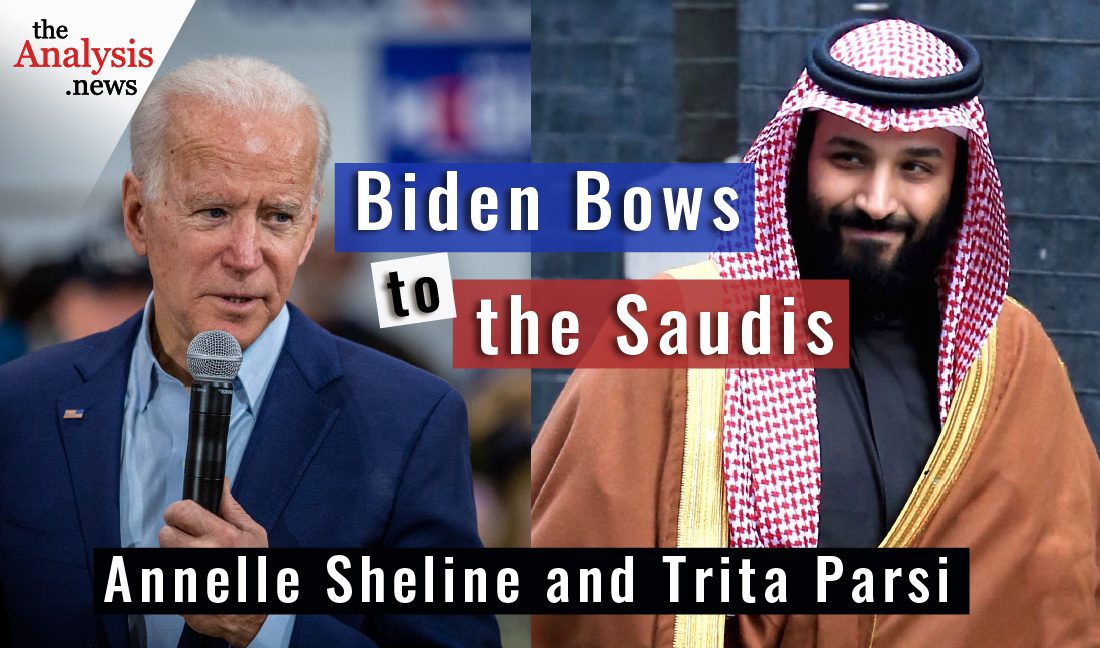
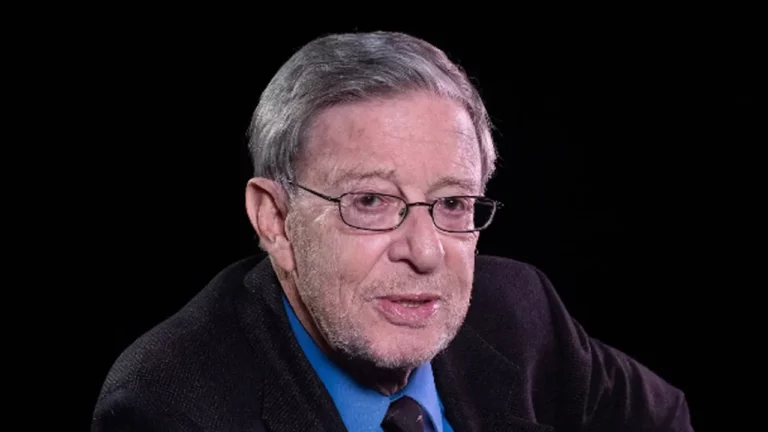
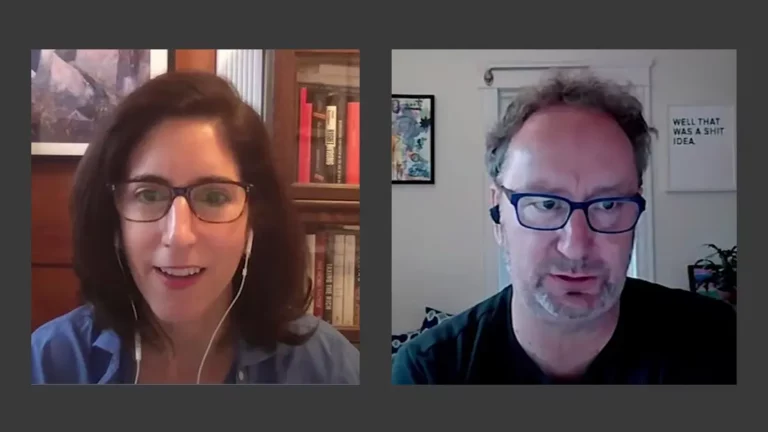
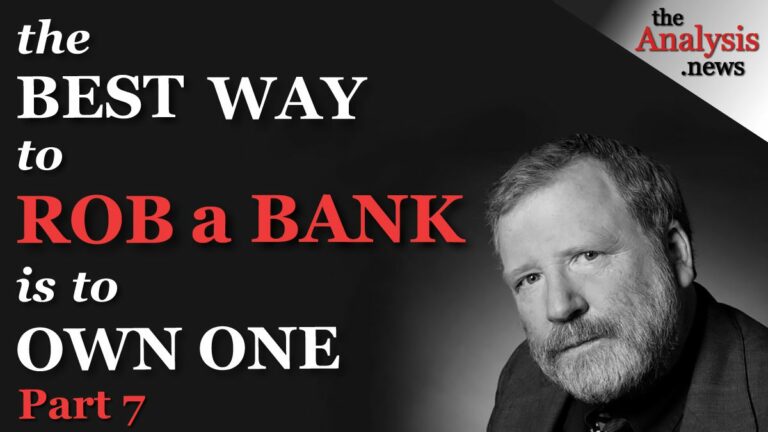
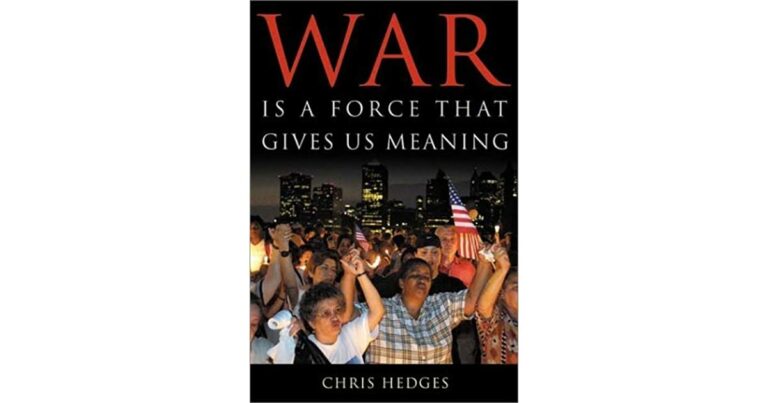
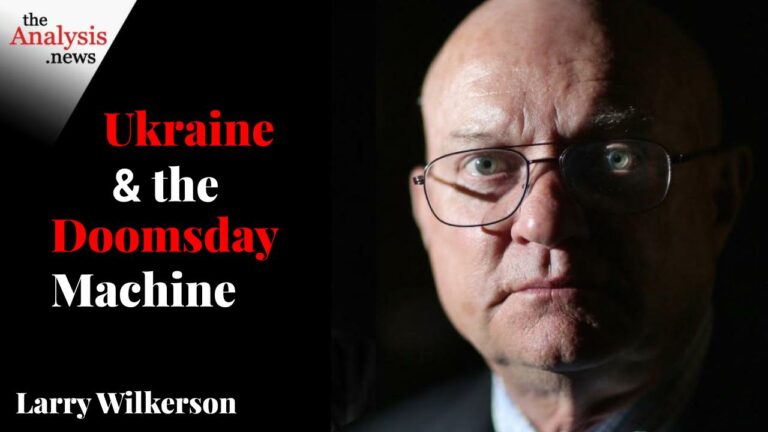
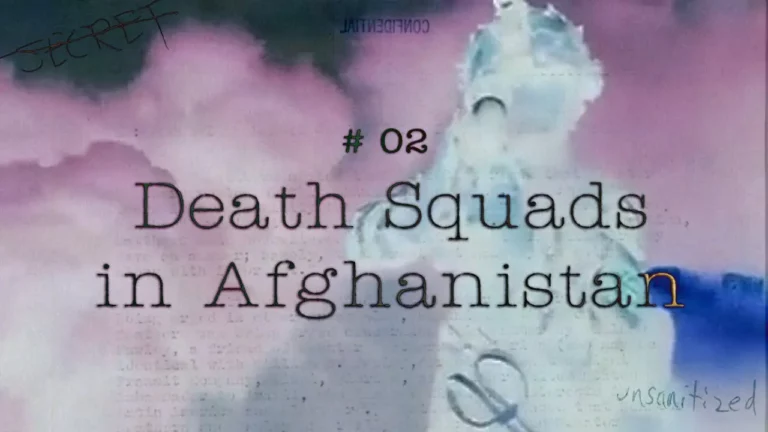
Age has nothing to do with it. Obama was much younger yet continued to support Saudi Arabia. It has way more to do with money, money, money.
I find blaming Yemen for its destruction far too glib, far too convenient for the U.S., the Saudis, et al.
Suggestion: look at the role of the Quincy Institute.
What is never looked at in this piece is: What is the material/dollar interest in Yemen, aside from the military industrial complex? Yemen has rich reserves of oil, gold, copper, etc. What is the Saudi interest in Yemen in terms of resources? Why is all this information conveniently ignored?
A difference between Biden and Trump is a mirage. Can anyone name a foreign policy difference? I look around and see growing rot in the West. Time to take a serious look at who runs the U.S.
I really need to point out the major funders of the Quincy Institute: Remaining Koch brother and Soros. Strange bedfellows, eh? Any problems here? It is not easy to follow who else is involved. Tax returns are really strange.
I would be interested in hearing any comment from the Quincy Institute about Assange or Snowden.